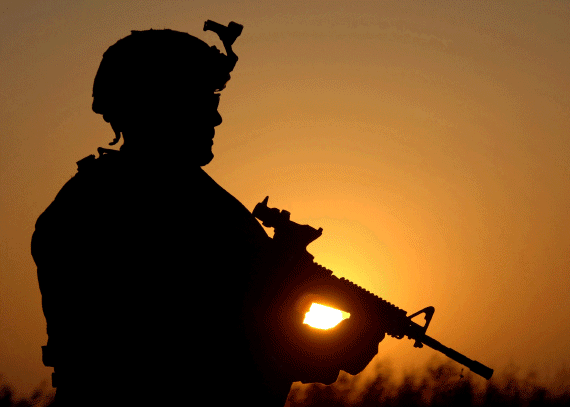Despite A Plethora Of World Crises, Americans Oppose Greater Foreign Intervention
Crisis seems to be brewing all over the world, but the American people aren't persuaded that it's necessary for the United States to act.
There’s been much discussion over the past several days about the fact that this seems to be a particularly bad, or at the very least active, time in international affairs. The war, and there doesn’t seem to be any better word for it at this point, in Iraq between the Iraqi government and the ISIS insurgency continues apace. Although it did not receive much attention in the United States, the situation in Libya seems to be unraveling, with militias battling government forces for control of the Tripoli airport. The conflict in Ukraine, which was already starting to heat up before last Thursday, took a new a potentially more dangerous turn with the downing of Malaysia Airlines Flight 17. Finally, the two week old conflict between Israel and the forces of Hamas in Gaza intensified into a ground assault by Israeli forces who say that they intend to push their offensive until they have done significantly more damage to Hamas’s ability to attack Israeli territory with rockets and tunnels.
Amid all of this, most of the discussion over the weekend about the state of the world centered on what the United States should do about the situation, including plenty of criticism of President Obama for not being pro-active enough. Notwithstanding all of this, though, a new poll commissioned by Politico shows that the state of the world has not caused the American public to become more supportive of a more interventionist foreign policy:
Amid deepening violence across Eastern Europe and the Middle East, Americans are recoiling from direct engagement overseas and oppose U.S. involvement in Afghanistan, Iraq, Syria and Ukraine by large margins, according to a POLITICO poll of 2014 battleground voters.
The survey provides a unique look at the foreign policy attitudes of voters who will decide the most competitive Senate and House races this fall. It shows an intensely skeptical view of American military intervention:
Asked whether the U.S should do more to counter Russian aggression in Ukraine, just 17 percent answered in the affirmative. Thirty-one percent said the current policy is correct and 34 percent said the U.S. should be less involved. The poll was completed before the downing last week of Malaysia Airlines Flight MH17, the civilian airliner that was apparently attacked over eastern Ukraine.
More than three-quarters of likely voters say they support plans to withdraw all troops from Afghanistan by the end of 2016. Only 23 percent oppose the plan.
Forty-four percent of likely voters favor less involvement in Iraq’s civil war, versus 19 percent who favor more involvement and 23 percent who say the current level of involvement is appropriate.
A 51 percent majority said the situation in Iraq affects U.S. national security “a little” or “not at all.” Forty-two percent said it affects U.S. national security “a lot.”
Likely voters prefer less involvement in Syria’s civil war over more involvement, 42 percent to 15 percent. Twenty-six percent of likely voters support the current, limited level of involvement.
On the issue of foreign policy specifically, voters say they trust Republicans over Democrats by 7 points, 39 percent to 32 percent. Twenty-eight percent said they were unsure which party to trust.
The picture that emerges from the survey is consistent across issues of foreign policy and national security: Americans are profoundly wary of getting entangled overseas and seem to be skeptical of the value of projecting U.S. power on foreign conflicts. Republicans are modestly more hawkish than Democratic and independent voters, but a majority of self-identified GOP voters support pulling out of Afghanistan and maintaining or reducing involvement in Iraq, Syria and Ukraine.
In the big picture, two-thirds of respondents agreed with the statement that U.S. military actions should be “limited to direct threats to our national security.” Only 22 percent agreed with the statement that as a “moral leader,” the United States “has a responsibility to use its military to protect democracy around the globe.”
There are some caveats to note about this poll before discussing it in detail. For one thing, the poll was conducted between July 3rd and 13th, which was obviously before the downing of Flight 17 and before the situation in Gaza escalated to its currents levels. Since its only been four days since the Flight 17 incident, for example, its hard to say what impact that might have on public opinion regarding what America’s interests in the situation Ukraine might be. That will have to wait for future polling. Nonetheless, the Ukraine situation has been in the news enough over the past several months that its fair to say that it has become part of the public consciousness. Another caveat is that the poll isn’t a nationwide sample; instead it is a sample of “834 likely voters in competitive U.S. House and Senate races.” Additionally, the poll was “conducted online using GfK’s KnowledgePanel methodology, which is also employed by The Associated Press.” Limiting the poll to just select Congressional districts and states means, at least potentially, that we aren’t getting a clear picture of national public opinion, although that problem can be dealt with to some extent if the demographics of the poll roughly match what you’d expect from the national electorate. Based on the full poll results, that appears to be the case here. Additionally, while pure online polls are obviously garbage, type of online polling used here has fared well in the last couple election cycles.
These caveats notwithstanding, these poll numbers are similar enough to previous polling on issues of international affairs that they are likely a fairly accurate representation of what Americans think about whats going on in the world right now. Ever since the Iraq War started turning south late in the Bush Administration and the war in Afghanistan went from the “good” war to a pointless shooting gallery, public opinion regarding foreign affairs has become increasingly anti-interventionist. Even during the height of our involvement, Americans opposed the intervention in Libya notwithstanding the long history between the United States and the Gaddafi regime. Other polling has shown the public skeptical of the idea of military confrontation with with Iran over its nuclear program, and supportive of reaching a negotiated agreement with the Islamic Republic, even though that nation has been an adversary since 1979. Afghanistan has become an incredibly unpopular war, and the American people seem to prefer getting out sooner rather than later. The rise of ISIS as a threat to the regime of Prime Minister Nouri Al-Maliki has had no real impact at all on public opinion regarding Iraq. In general, it seems, Americans are telling their leaders that they aren’t really interested in seeing more foreign intervention, and even the fact of a world in what some might describe as chaos has not had much of an influence on that opinion.
While I’m generally sympathetic to the idea of a non-interventionist foreign policy, it’s apparent that there are some ways in which public attitudes such as these could become a problem for an American President, and more broadly American interests. Whether we like it or not, there are often times where world events require some kind of response from the United States; that’s why I have argued — see here, here, and here — that calling people who support non-interventionist policies “isolationist” amounts to little more than a smear. However, if the American public has a reflexive position against all intervention absent direct threats to the United States, as this poll seems to suggest, that makes it much harder for any President to build the political case for action he or she believes to be necessary, especially a President such as this one who has basically lost the confidence of the American public when it comes to foreign policy. Perhaps this attitude will change as circumstances change. The American people have been known to be quick to wake up from a slumber when world events dictate that its necessary after all. However, one has to wonder if that will have to wait for something far more serious to happen, or a President better able to lead the nation.







I think this is blowback from George and Dick’s Excellent Adventure in Iraq. We now have a knee-jerk reaction that the U.S. government is lying to us, the neo-cons are perfectly happy to egg on another war so that $$ goes into the pockets of arms contractors, and since it’s not their children who are doing the fighting, they’re perfectly happy to send someone else’s kids off to die.
Plus, we’re worn out. How much money did we waste on Iraq? Money which if we had taken and used in the US would have fixed a huge load of problems? Money which we still haven’t paid for?
This poll and it’s interpretation seem pretty ambiguous. The headline question is specifically about military intervention, which seems to then be conflated with any intervention.
War-weariness is a big part of this but there’s something deeper, I think: after the Iraq debacle and the current defeat-in-all-but-name of Afghanistan, we have lost the national self-assurance we once had.
There was a time we all thought America could succeed in any endeavor. We won WW2! We rebuilt Europe! We experienced a massive economic prosperity! We put a man on the moon! We won the Cold War! The defeats along the way–the stalemate in Korea, the USSR beating us into space, the loss in Vietnam–were counterbalanced by the great achievements.
Today we don’t have the counterbalance. All we have is a huge terrorist attack that reduced two of the world’s most impressive feats of engineering and construction to smoking rubble and killed 3,000 people, along with any illusion we are ‘safe at home.” We have the unmitigated disaster of Iraq and the current sad state of that country because of it. We are mired in Afghanistan with little to show for more than a decade of bloodshed. The economy, for many (if not most) Americans, remains moribund. There doesn’t seem to be a bright future, a future of possibilities, ahead.
It’s no wonder many Americans want to withdraw and take care of things here before we get sucked into yet another pointless and futile adventure in some unpronounceable place halfway around the world.
IOW, the public supports what Obama is doing, but they don’t approve of Obama. I think this is old news. If McCain or Romney were in office, we would be actively engaged in at least two of these crises, probably with boots on the ground. We would have had troops on the ground in Libya. The things is, Americans tend to fall in line and, initially, support almost any military intervention in which we participate. However, that approval does not last. You need to have positive results. We did not have those in Iraq or Afghanistan. We don’t have much real leverage or ability to alter things in Ukraine or Iraq. Our internal politics will keep us from doing anything about Israel/Gaza, and not sure we can do much anyway. Same goes for Libya.
Steve
@Mikey: You’re right, but I think it goes deeper than wars and the space program. Although to be honest, for me personally it goes back to Vietnam, when we knew the government was lying, not to mention trying to shanghai me into shooting and being shot at for nothing. I frankly feel a lot of it is a generation plus of conservative domination of politics and policy. It makes me crazy when I hear people blame anything they see as deterioration on Obama and liberals. Republican and conservatives built out current situation. But after decades of “greed is good”, “the government is the problem”, “taxes are theft”, and the W administration; is it any wonder we no longer have the collective can-do attitude we once had?
That is rather at odds with the policy preferences that were stated on the Ukraine, Afghanistan, and Iraq, It is amazing how people manage to compartmentalize.
The first half of your title explains the second half. And you can turn the preceding sentence around and it’s still accurate. A plethora of world crises and we don’t want to get involved. Who would have thought that?
The problem is that none of the crises mentioned above (Libya, Syria, Ukraine, Iraq) directly involve American interests. At last some of them do directly involve European interests and I have no doubt that our European allies would be delighted if we would be willing to carry their water (again) but the American people are, rightly, tired of doing that.
Not just a smear, but a pretty meaningless one…you don’t even have to consistently advocate non-interventionist foreign policy to be labeled an “isolationist” (esp. by some on the right) nowadays, only to decline to make war on/in whatever country is the crisis point of today’s news cycle.
(For example, I honestly don’t care whether the Crimea is part of Ukraine or Russia at the end of the day, which apparently makes me an isolationist.)
It’s been thrown around so promiscuously that it’s almost lost all meaning, much like the terrible Hitler/Chamberlain/Munich metaphors.
@Dave Schuler:
The response to that in other forums (MMA etc) would be: /thread
I think that, together with Grumpy’s first post, nicely sums it up for many people.
Be cautious with small numbers. Among other issues to have with this poll is 1. It’s limited to Politico’s “Battleground” grounds, 2. It’s a weird way to poll and lacking historical data to track longitudinally over time I think the jury’s still out on its utility.
What Dave Schuler said about Europe, also.
Eventually Amiercan will have the foreign policy that the paleocons and the far left has been pushing for years. The only problem is that it will not be for the reasons that the Paleo-Cons or Code Pink types want it.
In the end, a country where politics is a fight over entitlements and how to pay for them will have no time or energy for foreign adventures. Just look at most of Europe as having already gotten to this state of affairs.
@superdestroyer: Your reference to how we will turn into a one-party state was too oblique. You need to step that part of the message up.
Below usual standards–Grade: C-.
reminds me of that commercial from years ago- “you can pay me now, or pay me later”.
@Just ‘nutha’ ig’rant cracker:
The U.S. could achieve a Jeffersonian Foreign Policy (as the Paleocons call it) with some form of a two party. The conditions that will push the U.S. to such a foreign policy is continuing economic sluggishness, a grow percentage of the foreign policy being immigrants, a growing national debt, and massive budget cuts to the Defense Budget.
We are one of the few countries who have done our bit consistently to help the rest of the world.
Time for others to step up to the plate.